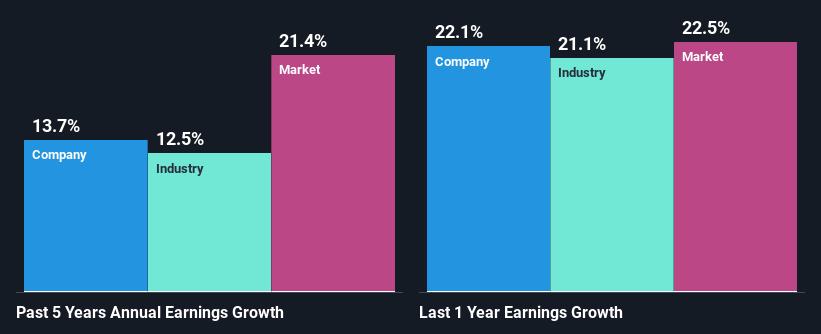- India
- /
- Gas Utilities
- /
- NSEI:ATGL
Declining Stock and Solid Fundamentals: Is The Market Wrong About Adani Total Gas Limited (NSE:ATGL)?
Adani Total Gas (NSE:ATGL) has had a rough three months with its share price down 9.8%. However, a closer look at its sound financials might cause you to think again. Given that fundamentals usually drive long-term market outcomes, the company is worth looking at. In this article, we decided to focus on Adani Total Gas' ROE.
Return on Equity or ROE is a test of how effectively a company is growing its value and managing investors’ money. In simpler terms, it measures the profitability of a company in relation to shareholder's equity.
Check out our latest analysis for Adani Total Gas
How To Calculate Return On Equity?
The formula for ROE is:
Return on Equity = Net Profit (from continuing operations) ÷ Shareholders' Equity
So, based on the above formula, the ROE for Adani Total Gas is:
19% = ₹6.7b ÷ ₹36b (Based on the trailing twelve months to March 2024).
The 'return' is the yearly profit. So, this means that for every ₹1 of its shareholder's investments, the company generates a profit of ₹0.19.
What Has ROE Got To Do With Earnings Growth?
We have already established that ROE serves as an efficient profit-generating gauge for a company's future earnings. Depending on how much of these profits the company reinvests or "retains", and how effectively it does so, we are then able to assess a company’s earnings growth potential. Generally speaking, other things being equal, firms with a high return on equity and profit retention, have a higher growth rate than firms that don’t share these attributes.
Adani Total Gas' Earnings Growth And 19% ROE
To begin with, Adani Total Gas seems to have a respectable ROE. Even when compared to the industry average of 19% the company's ROE looks quite decent. Consequently, this likely laid the ground for the decent growth of 14% seen over the past five years by Adani Total Gas.
Next, on comparing Adani Total Gas' net income growth with the industry, we found that the company's reported growth is similar to the industry average growth rate of 13% over the last few years.

Earnings growth is an important metric to consider when valuing a stock. The investor should try to establish if the expected growth or decline in earnings, whichever the case may be, is priced in. By doing so, they will have an idea if the stock is headed into clear blue waters or if swampy waters await. Is Adani Total Gas fairly valued compared to other companies? These 3 valuation measures might help you decide.
Is Adani Total Gas Efficiently Re-investing Its Profits?
In Adani Total Gas' case, its respectable earnings growth can probably be explained by its low three-year median payout ratio of 5.2% (or a retention ratio of 95%), which suggests that the company is investing most of its profits to grow its business.
Additionally, Adani Total Gas has paid dividends over a period of five years which means that the company is pretty serious about sharing its profits with shareholders.
Summary
On the whole, we feel that Adani Total Gas' performance has been quite good. Specifically, we like that the company is reinvesting a huge chunk of its profits at a high rate of return. This of course has caused the company to see substantial growth in its earnings.
New: Manage All Your Stock Portfolios in One Place
We've created the ultimate portfolio companion for stock investors, and it's free.
• Connect an unlimited number of Portfolios and see your total in one currency
• Be alerted to new Warning Signs or Risks via email or mobile
• Track the Fair Value of your stocks
Have feedback on this article? Concerned about the content? Get in touch with us directly. Alternatively, email editorial-team (at) simplywallst.com.
This article by Simply Wall St is general in nature. We provide commentary based on historical data and analyst forecasts only using an unbiased methodology and our articles are not intended to be financial advice. It does not constitute a recommendation to buy or sell any stock, and does not take account of your objectives, or your financial situation. We aim to bring you long-term focused analysis driven by fundamental data. Note that our analysis may not factor in the latest price-sensitive company announcements or qualitative material. Simply Wall St has no position in any stocks mentioned.
About NSEI:ATGL
Adani Total Gas
Engages in the city gas distribution (CGD) business in India.
Mediocre balance sheet with questionable track record.
Similar Companies
Market Insights
Community Narratives


